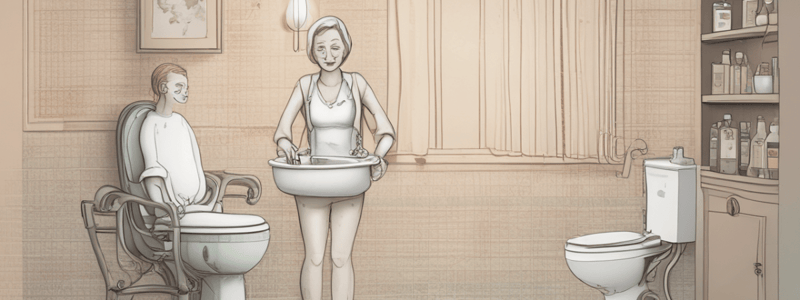Podcast
Questions and Answers
Which risk factor should be assessed for when considering treatment selection for prostatitis?
Which risk factor should be assessed for when considering treatment selection for prostatitis?
- Having only one sexual partner
- Engaging in unprotected sex (correct)
- Age above 50 years
- Lack of anonymous sex partners
What is a key factor for a drug to penetrate into the prostatic fluid?
What is a key factor for a drug to penetrate into the prostatic fluid?
- Plasma protein binding of the drug
- Molecular weight of the drug
- Lipid solubility of the drug (correct)
- Hepatic metabolism of the drug
What is a recommended treatment duration for most patients with acute prostatitis?
What is a recommended treatment duration for most patients with acute prostatitis?
- 21 days
- 7 days
- 14 days (correct)
- 30 days
Which antibiotic is recommended for uncomplicated acute prostatitis in patients with low risk of sexually transmitted diseases?
Which antibiotic is recommended for uncomplicated acute prostatitis in patients with low risk of sexually transmitted diseases?
Under what circumstances would a patient be considered for admission and IV antibiotics for prostatitis?
Under what circumstances would a patient be considered for admission and IV antibiotics for prostatitis?
Which type of incontinence is characterized by small volume leakage with activities such as lifting, coughing, sneezing, and laughing?
Which type of incontinence is characterized by small volume leakage with activities such as lifting, coughing, sneezing, and laughing?
What is the primary problem in stress incontinence?
What is the primary problem in stress incontinence?
Which of the following is NOT a risk factor for stress incontinence?
Which of the following is NOT a risk factor for stress incontinence?
What is the main goal of non-pharmacologic treatment for urge incontinence?
What is the main goal of non-pharmacologic treatment for urge incontinence?
Which class of medication for urge incontinence works by antagonizing muscarinic receptors and suppressing detrusor contractions?
Which class of medication for urge incontinence works by antagonizing muscarinic receptors and suppressing detrusor contractions?
Which type of incontinence is characterized by leaking urine while performing physical activities like coughing or sneezing?
Which type of incontinence is characterized by leaking urine while performing physical activities like coughing or sneezing?
What type of incontinence is characterized by a sudden urge to urinate and often associated with frequency and nocturia?
What type of incontinence is characterized by a sudden urge to urinate and often associated with frequency and nocturia?
Which medication type can contribute to stress urinary incontinence by causing urethra relaxation and loss of tone?
Which medication type can contribute to stress urinary incontinence by causing urethra relaxation and loss of tone?
What is the main effect of diuretics in contributing to urinary incontinence?
What is the main effect of diuretics in contributing to urinary incontinence?
What is a common symptom that should prompt a referral due to abrupt onset and potential serious underlying issues?
What is a common symptom that should prompt a referral due to abrupt onset and potential serious underlying issues?
What is the term for a sudden, strong need to urinate?
What is the term for a sudden, strong need to urinate?
Which of the following is a risk factor for urinary incontinence?
Which of the following is a risk factor for urinary incontinence?
Which type of receptors are responsible for bladder contraction in the urinary tract?
Which type of receptors are responsible for bladder contraction in the urinary tract?
What is the recommended screening method for older adults to evaluate incontinence?
What is the recommended screening method for older adults to evaluate incontinence?
Which of the following is a potential adverse effect of antimuscarinic agents in patients with urge incontinence?
Which of the following is a potential adverse effect of antimuscarinic agents in patients with urge incontinence?





